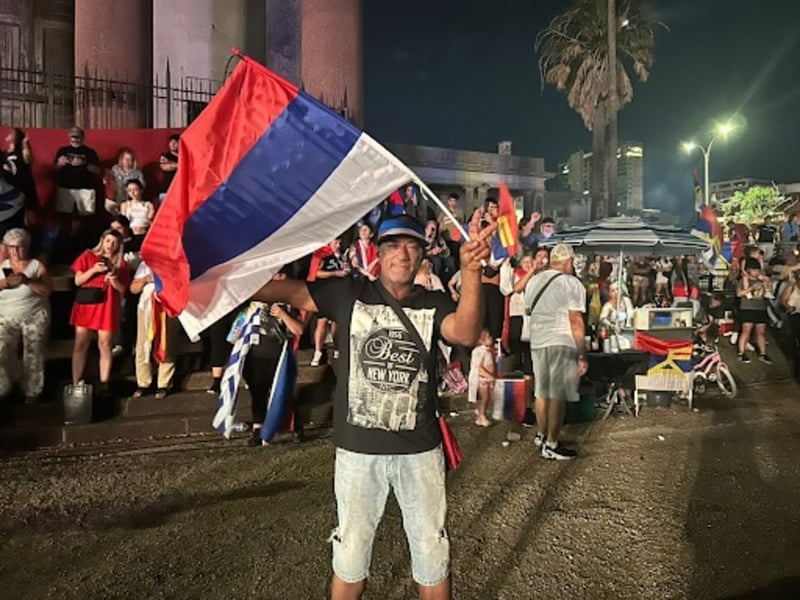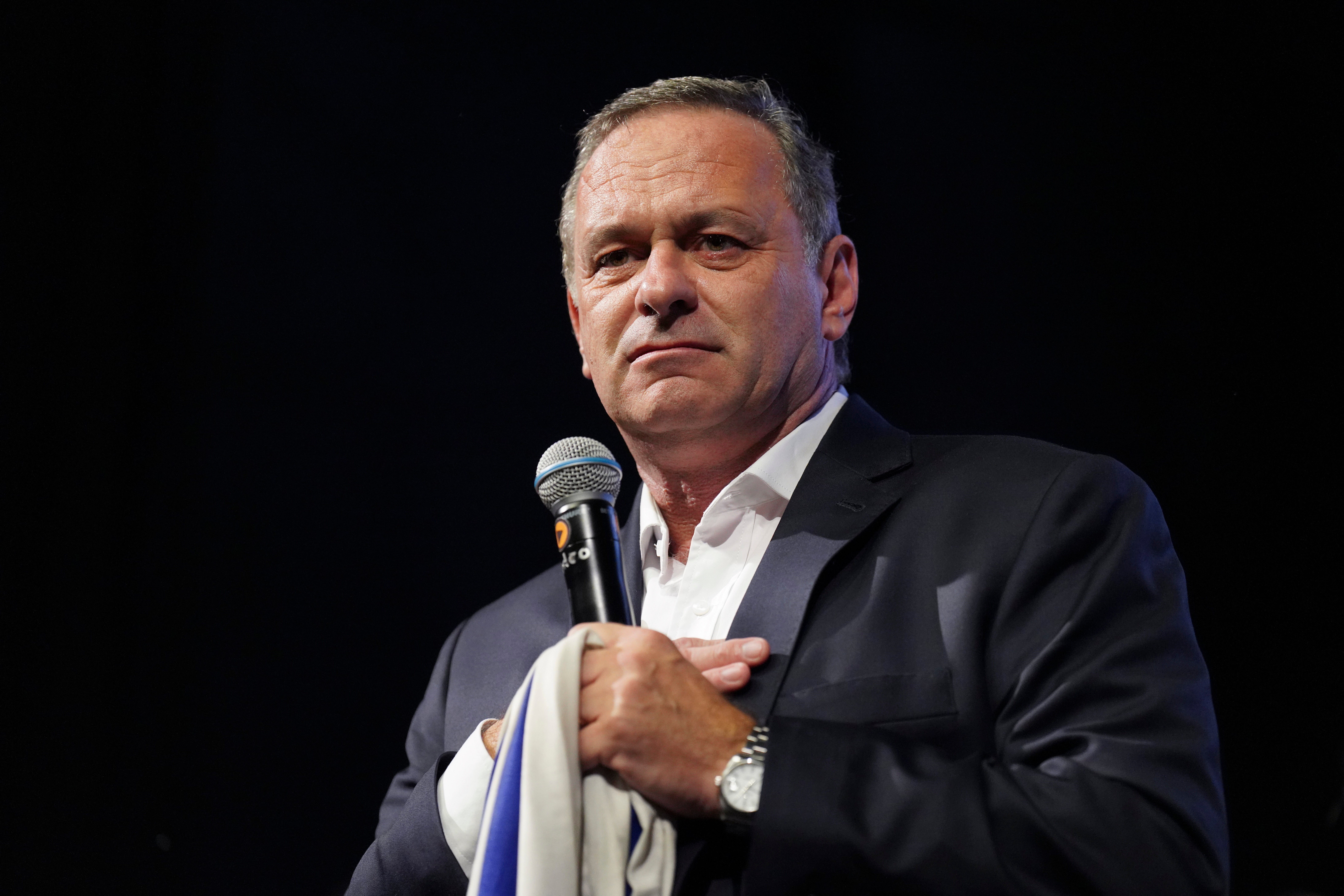MONTEVIDEO, Uruguay (CN) — Diego Márquez, 59, waved his blue, white and red flag, tears of joy streaming down his face as he listened to the election results. A factory worker and father of two, Márquez lost his job when the factory he worked for shut down under the current administration of President Luis Lacalle Pou.
“I haven’t been able to get back on my feet since,” he said.
Yet his faith in the Broad Front, the leftist coalition he supported, never wavered.
“I trusted this beautiful movement,” Márquez said. “I knew we’d come back.”

He was among thousands of Uruguayans flooding Montevideo’s streets Sunday night, celebrating the victory of Yamandú Orsi in the presidential runoff. Orsi, the Broad Front’s candidate, defeated Álvaro Delgado of the Multicolor Coalition, which had governed since 2020.
But just an hour after voting ended on Sunday, the exit polls showed a clear victor. Election officials announced Orsi and his vice presidential candidate, former Montevideo Mayor Carolina Cosse, won with 49.8% of the vote against the Multicolor Coalition’s 45.8%, confirming the comeback of Uruguay’s globally known left party into power.
Orsi, 57, is a history teacher and longtime politician who became mayor of Canelones, a city close to Montevideo, the Uruguayan capital. He ran alongside Cosse, an electrical engineer elected second in the Front’s internal elections earlier this year. Cosse was a part of the previous Broad Front governments in telecommunications and, later, as the minister of Industry, Mining and Energy. Their new government will take office on March 1.

Gael García and Nahuel Sosa, two 17-year-old cousins, joined the celebrations, too. Although they’re not old enough to vote, they are both very interested in politics.
“We went out with my grandmother to celebrate,” García said. “We waved flags with her and her neighbors.” He said he supports the Broad Front for its social justice ideas and plans to redistribute wealth more equally.
“I hope that Uruguay becomes a place with opportunities for everyone,” Sosa said.
Voters cite violence, housing and jobs as major issues
Orsi’s win comes after a campaign many saw as centered, with both coalitions focusing on the same few topics that marked this year’s race: safety, unemployment and corruption.
Uruguay’s 10% poverty rate remains one of the lowest in the region, yet crime rates are notably high, with over 10 homicides per 100,000 inhabitants annually. Unemployment sits at just over 7%, but a significant rise in the number of “veinticincomil-pesistas” — workers earning 25,000 Uruguayan pesos per month (less than $600) — has left nearly a third of the population struggling to cover basic expenses beyond rent.
Despite maintaining a relatively strong public image — a rarity for leaders navigating the pandemic and global crises — Lacalle Pou’s tenure saw corruption scandals involving high-ranking officials. These included the imprisonment of the president’s chief bodyguard for an affair and a case that led to ministerial resignations following the escape of a notorious drug trafficker.
During the campaign, Orsi vowed to address the country’s pressing concerns, such as street safety and the broader expansion of the drug trade and illicit networks — issues frequently cited by voters concerned about rising violence in their communities.

He promised to deploy more security to fight the growth of narco traffickers in Uruguay. He also aims to fight money laundering, which has increased significantly during the last five years due to legal loopholes and a lack of enforcement resources.
Calm campaign
Maximiliano Decaux, an activist for the Red Party, which turned its support to Delgado after their candidate came third in the general election with 16%, said that the next government will need to cooperate with all parties.
“They are going to have to work together,” he said. “Corruption cannot be fixed overnight.”
After he conceded Orsi’s victory, his counterpart Delgado congratulated him and sent him “a big hug.”
“A new time has come, under which no one has the majority,” he said. He added that they will seek to build agreements with the new government that will begin in March.

During the campaign, calm and consensus reigned.
“Their platforms looked quite similar,” said Adolfo Garcé, a political scientist and university professor. “Because there’s a general belief that the elections are won by the undecided and that the undecided are center-leaning — so both candidates moderated themselves.”
Garcé noted key similarities between Delgado and Orsi, highlighting that the men belong to the same generation and share a propensity for dialogue. However, he emphasized that the parties they represent are fundamentally different: “The Broad Front is a leftist party focused on equality, while the Multicolor Coalition prioritizes freedom.”
He said that Orsi’s coalition enjoys stronger ties with unions and workers’ movements, whereas Delgado is more aligned with the business sector.
“It’s very Uruguayan — this tendency toward moderation — but these are fundamentally distinct political projects,” he said. “The difference may not be vast, but it is unmistakable.”
Susana García, 66, who works as a house cleaner, walked across 18 de Julio Avenue in Montevideo holding a Broad Front flag after casting her vote for Orsi.
“They’re closer to the people, they advocate for more unity,” she said. García, a pseudonym she requested due to fear of reprisals at work, is an Afro-Uruguayan woman who receives 18,000 Uruguayan pesos from her pension after 30 years of work — approximately $420, which barely covers rent. She also continues working.
“I feel we, retired people, are treated as if we were disposable,” she said. A few years ago, one of her daughters moved to the United States seeking a more prosperous economic future, and she hopes her youngest one, now 24, will do so too.
“I don’t see a bright future for them here in Uruguay,” she said.
The emigration of young people has been a longstanding topic in local politics. It started during the ’70s, amid political violence and a military dictatorship, but has remained high ever since for economic or professional reasons: In a small country with a lack of opportunities for those starting their careers, many who can move away. Over 10% of the population of Uruguay lives outside the country, most in Argentina, Spain and the U.S.
“Many of my friends have left due to lack of work and reasonable salaries,” said Florencia Reta, 30, who joined the celebrations with her friend Tamara Corto, 24. “Maybe now that the Broad Front is back, some will consider returning.”
A comeback for progressive politics?
While Uruguay is often seen as a quiet nation, locked between two larger neighbors — Brazil and Argentina — the country has been somewhat relevant to the region’s politics over the decades.
Recently, during the Broad Front governments of Tabaré Vázquez and José “Pepe” Mujica between 2005 and 2020, Uruguay became a bastion of progressive legislation on sexual and reproductive rights, same-sex marriage, public health policies and the use of recreational drugs, among other issues.
But some of those measures, said Tamara Samudio, a local political analyst, have worn off over the last years, making social movements expect more from the upcoming government.
“Some laws and policies are not being properly enforced,” she said. “And many social demands from feminists and students, for example, have not been addressed.”
Although the Broad Front worked to move closer to advocacy groups after losing the 2019 election to the National Party, Samudio said the coalition has mostly failed to do so.
Mujica, who became a leader globally known for his austerity and leftist political views, announced early this year that he has a severe form of esophageal cancer. However, he participated in a few public events to support Orsi.
Although candidates and advocates emphasized the decisive nature of this election, Uruguay stood out this year for its calm campaign and election with no violence.
Garcé said that respect for democracy is one area where Uruguay stands out in the current global context. “We’re lacking many things, but Uruguayan politics give a good example to other countries,” he said.
Democratic transfers of power are a sign of a healthy citizenry, he said. However, Garcé looks closely at the shifting politics in the world, where he sees a growing general dissatisfaction.
Gustavo Salle won 3% of the vote during the general election by preaching antiestablishment policies grounded in arguments against gender identity, vaccines and traditional politics. His party, Sovereign Identity (Identidad Soberana), gained two seats in the House, but none in the Senate.
“He’s a sign of political discontent,” Garcé said. “It’s the first time that such a radicalized speech against traditional politics wins seats in Parliament.”
But many Uruguayans were pleased with the outcome of their election.
The pouring rain did not halt the celebrations, which extended into midnight with flag-waving, honks and cheers from those who had awaited the return of their party.
Orsi and Cosse will ride that wave of enthusiasm into office, while voters wait to see what campaign promises will be fulfilled.
“There’s a lot of work ahead,” Reta said. “Social movements will remain vigilant, protecting our rights and ensuring no ground is lost.”